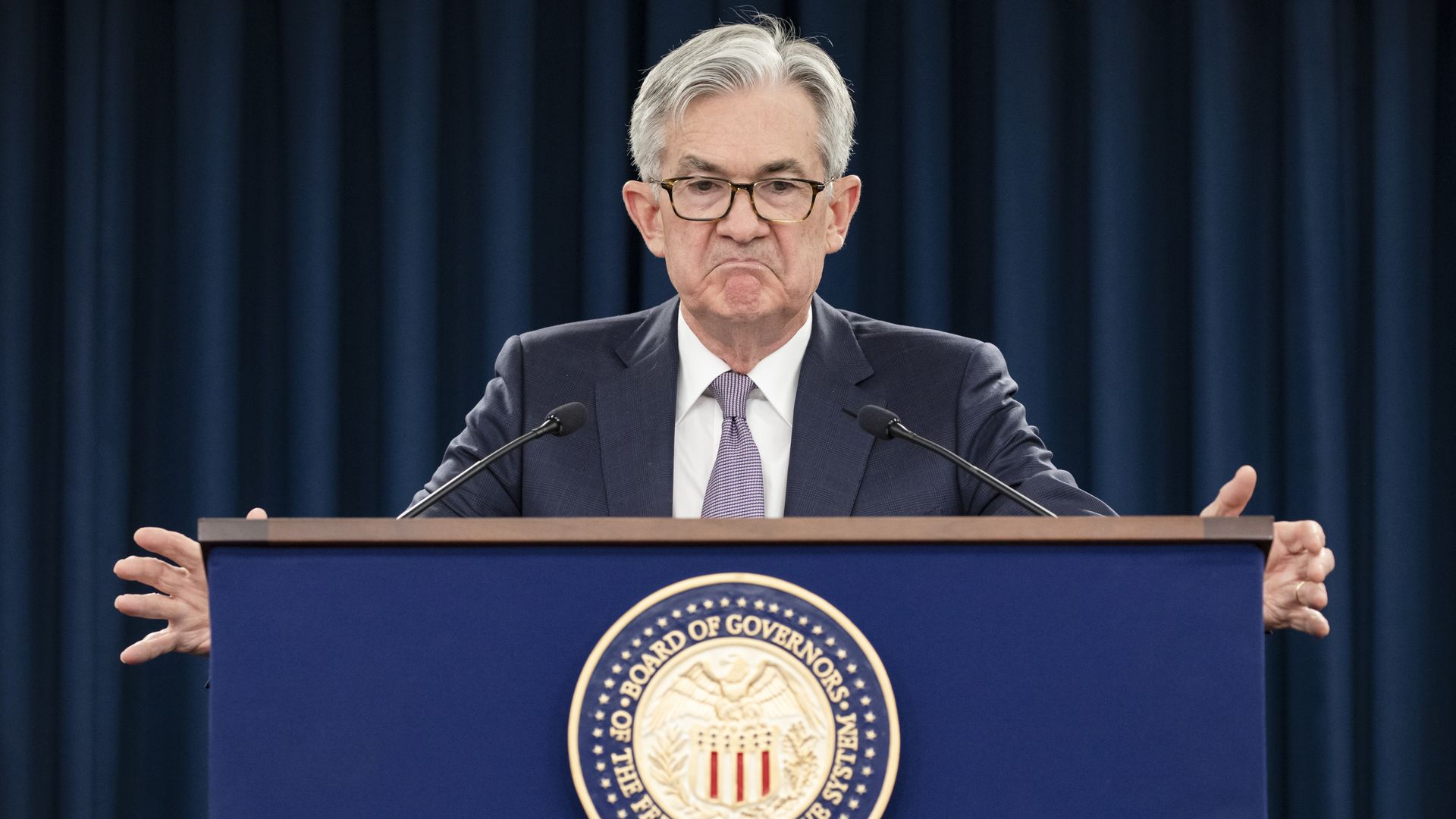| | | | | | | Presented By Help Scout | | | | Axios Markets | | By Dion Rabouin ·Mar 18, 2021 | | Good morning! Was this email forwarded to you? Sign up here. (Today's Smart Brevity count: 1,292 words, 4.8 minutes.) Situational awareness: The Bank of England will announce its rate policy decision at 8am ET. 🎙 "The most luxurious possession, the richest treasure anybody has, is his personal dignity." - See who said it and why it matters at the bottom. | | | | | | 1 big thing: The Fed's inflation conundrum |  | | | Photo: Samuel Corum/Getty Images | | | | Fed chair Jerome Powell is attempting something of a high-wire circus act as the central bank pushes forward with its average inflation targeting regime. - He's trying to simultaneously raise inflation while keeping short-term interest rates low and stimulate the economy through unprecedented and extraordinary measures while convincing Americans the economy is doing well.
Driving the news: The Fed kept its policy rate unchanged on Wednesday but sharply ramped up its expectations for economic growth — while affirming that it does not plan to raise interest rates until after 2023. Why it matters: U.S. inflation expectations have shot up in recent months while unemployment remains incredibly high, a potentially devastating combination for the economy. What we're hearing: "The Fed released its new framework last year and it's showing that it means it," former Fed economist Claudia Sahm tells Axios. - "Always in the past, expected inflation was what drove the Fed to say, 'Whoa, we're going to ease up here and in fact might tap on the brakes.' That's always been how the Fed worked."
- Now the Fed is "showing that it's not all about inflation, and it's not about expected inflation. It's about jobs and inflation and with the inflation, we have to see a sustained period of inflation above 2% before we're going to pull back."
What's happening: That new framework is pushing investors and they're pushing market gauges of inflation like the 10-year Treasury yield to 1.74%, its highest in more than a year, and 5-year breakeven rates to their highest level in nearly 13 years. - Consumers, seeing consistently higher food, gas and auto prices, as well as increasing mortgage and loan rates also are predicting rising inflation, with a recent New York Fed survey showing the highest consumer inflation expectations in seven years.
- Google searches for inflation have jumped to their highest since record-keeping began in 2008, according to Deutsche Bank research.
Yes, but: While Powell has been content to let longer-term interest rates, which correspond with consumer products like mortgages, rise higher, he has fixated on keeping short-term rates, which correspond with the cost of borrowing for banks and large financial institutions, low. - By insisting that the Fed isn't even thinking about thinking about raising rates, yields on short-dated Treasuries fall because they are closely tied to Fed policy.
The bottom line: "They've masterfully navigated this meeting by sounding somewhat optimistic on the economy but staying dovish on the policy path," Subadra Rajappa, interest rates strategist at Société Générale, tells Axios. - "If the Fed were to even suggest they're hiking soon the market will quickly price in multiple hikes and that would be much more negative for the economy."
|     | | | | | | Bonus quote: A loose connection | | During his press conference Powell also made the following comment about the connection between low interest rates and asset prices: "I would point out that over the long expansion, the longest in U.S. history, 10 years and eight months, rates were very low … during that we didn't see excess build-up of debt, we didn't see asset prices forming into bubbles that would threaten the progress of the economy, we didn't see a housing bubble, the things that have tended to really hurt an economy and have in recent history hurt the U.S, we didn't see them build up despite very low rates." "The connection between low rates and financial instability is just not as tight as people think it is." My thought bubble: 😂😂😂🤣🤣🥲 |     | | | | | | 2. Catch up quick | | The IRS plans to push back the tax filing deadline about one month to May 17, as the agency says it still is working through a backlog of 24 million filings from 2019. (Washington Post) Global demand for gasoline has peaked, the International Energy Agency predicted in its latest five-year outlook. (WSJ) |     | | | | | | A message from Help Scout | | How businesses can provide greater customer service | | |  | | | | Customer service platform Help Scout is offering an in-depth course that explores the building blocks for reliable, high-quality customer experiences. The background: The six-part skill-building course is designed uniquely to support pros. Get the $99 valued course for free. | | | | | | 3. Report: Student loan forgiveness most effective if targeted |  Data: Federal Reserve; Chart: Axios Visuals Proposals to forgive limited one-time sums of student loan debt that have been floated by the White House and members of Congress do little to address the heart of the $1.7 trillion problem, research from the JPMorgan Chase Institute finds. Why it matters: Ballooning student loan debt "is a financial crisis for millions of Americans," JPMorgan Chase Institute co-president Fiona Greig said in a statement. - "Our analysis shows that targeting student loan forgiveness by income would be more cost-effective in channeling relief to the hardest-hit families whose circumstances make it difficult to repay and who, in some cases, face a long-term debt trap from their education."
The big picture: "Any long-term solution to relieving the burden of student debt is incomplete without addressing underlying issues, such as increasing tuition costs," the research paper argues. Between the lines: Previous studies from the institute have found that younger and low-income families are the most burdened by student loan payments and that low-income families are less likely to make consistent loan payments (44%) compared to high-income families (63%). One level deeper: Using anonymized administrative banking and credit bureau data to estimate the benefits of student loan forgiveness, the institute found that "income cut offs significantly reduce costs and make cancellation more progressive, though all scenarios distribute forgiveness across borrowers by race in roughly the same way." |     | | | | | | 4. The coming corporate tax hike | | Axios Sneak Peek co-author Hans Nichols writes: Democrats are zeroing in on raising the corporate tax rate from its current 21% to 28% as one of the easiest ways to find new revenue for an infrastructure package. The big picture: While many senators are signaling that President Biden's next big-ticket bill must come with a way to pay for it, the White House and its Democratic allies are growing confident they can get there, in part, by increasing corporate taxes. - "We should pay for this once-in-a-generation infrastructure package," Sen. John Hickenlooper (D-Colo.) told Axios. "I'm eager to work with my colleagues on how to achieve this goal, including responsibly setting the corporate tax rate."
Driving the news: The White House is starting to telegraph Biden's priorities for new revenue — without previewing the full strategy. - Ike Brannon, a senior fellow at the Jack Kemp Foundation, said Democrats may feel politically insulated, at least in the short term, because "increasing corporate tax rates doesn't seem to anger too many people, and their major downside — reduced economic growth and jobs — aren't readily apparent."
Flashback: Prior to the Trump administration, the business community was pushing to lower the corporate rate from 35% to 25%. - Trump dropped it to 21%.
- Biden and his allies are convinced much of Trump's corporate cuts went to share-buybacks rather than new hiring.
Between the lines: Democrats suspect that after negotiations, Congress will settle on a corporate tax rate between 25% and 26%, less than Biden's proposed 28%. That would raise as much as $500 billion. The other side: "Democrats may think that 24% to 25% is low-hanging fruit," said Rohit Kumar, co-leader of PwC's national tax office. "But the battle is not yet joined." - The Business Roundtable "will be actively opposing efforts to raise corporate taxes," CEO Joshua Bolten told reporters last week.
- "Everyone loves infrastructure until you have to figure out how to pay for it," said Caroline Harris, vice president of tax policy at the Chamber of Commerce.
|     | | | | | | 5. Legacy media is booming |  Data: Investing.com; Chart: Axios Visuals Axios Media Trends author Sara Fischer writes: Stocks for traditional media networks are hitting record highs, thanks in large part to streaming. Why it matters: The COVID-19 crisis has taken a toll on the pay-TV industry, but investors feel optimistic that traditional content companies have value in launching their own streaming services or producing content for others. The big picture: Companies like ViacomCBS and Discovery that were once showing little or modest signs of growth have hit new highs on Wall Street. - ViacomCBS' stock has been one of the fastest-growing stocks this year, gaining roughly 146% since Jan. 1, seeing big gains since launching its new streaming service Paramount+ in early March.
- Discovery's stock has grown 156% since launching its streaming service Discovery+ last December. Before that, its stock price was plateauing.
Be smart: Lionsgate, ViacomCBS, Disney and other companies that rely on theater revenue are rallying in response to reports that movie theaters and parks are beginning to open across the country. Yes, but: Shares in ViacomCBS and Discovery fell Wednesday in response to analyst downgrades after months-long rallies that have carried both companies' stocks to unprecedented highs. |     | | | | | | A message from Help Scout | | How to enhance your company's customer service for free | | |  | | | | Help Scout is a customer service company — and this is the most in-depth course we've ever created on our craft. 6 parts, hours of video, designed uniquely for support pros: a $99 value, yours free. Learn more. | | | | Thanks for reading! Quote: "The most luxurious possession, the richest treasure anybody has, is his personal dignity." Why it matters: On March 18, 1942, Jackie Robinson requested a tryout with the Chicago White Sox, along with another Black player, Nate Moreland. Both men were allowed to work out, but were not signed. - The tryout was reportedly set up by Herman Hill of the Pittsburgh Courier and while White Sox manager Jimmy Dykes invited Robinson and Moreland to the tryout he refused to pose for pictures with them.
- The quote comes from Robinson, who integrated Major League Baseball five years later on April 15, 1947.
| | | | Axios thanks our partners for supporting our newsletters.
Sponsorship has no influence on editorial content. Axios, 3100 Clarendon Blvd, Suite 1300, Arlington VA 22201 | | | You received this email because you signed up for newsletters from Axios.
Change your preferences or unsubscribe here. | | | Was this email forwarded to you?
Sign up now to get Axios in your inbox. | | | | Follow Axios on social media:    | | | | | |







No comments:
Post a Comment